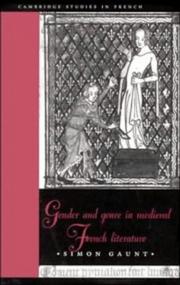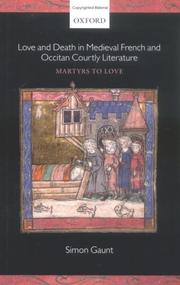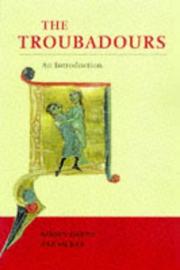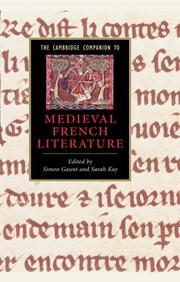| Listing 1 - 10 of 18 | << page >> |
Sort by
|
Book
ISBN: 0521354390 0521058481 0511553919 9780521354394 9780511553912 9780521058483 Year: 1989 Volume: 3 Publisher: Cambridge Cambridge University Press
Abstract | Keywords | Export | Availability | Bookmark
 Loading...
Loading...Choose an application
- Reference Manager
- EndNote
- RefWorks (Direct export to RefWorks)
From Petrarch and Dante to Pound and Eliot, the influence of the troubadours on European poetry has been profound. They have rightly stimulated a vast amount of critical writing, but the majority of modern critics see the troubadour tradition as a corpus of earnestly serious and confessional love poetry, with little or no humour. Troubadours and Irony re-examines the work of five early troubadours, namely Marcabru, Bernart Marti, Peire d'Alvernha, Raimbaut d'Aurenga and Giraut de Borneil, to argue that the courtly poetry of southern France in the twelfth century was permeated with irony and that many troubadour songs were playful, laced with humorous sexual innuendo and far from serious; attention is also drawn to the large corpus of texts that are not love poems, but comic or satirical songs.
Poetry --- Provençal, Occitan literature --- Provencal poetry --- Civilization, Medieval, in literature. --- Courtly love in literature. --- Irony in literature. --- Sex in literature. --- Troubadours. --- History and criticism. --- Provençal poetry --- Arts and Humanities --- Literature --- Provencal poetry - History and criticism. --- Jongleurs --- Troubadors --- Musicians --- Poets --- Courtly love --- Trouvères

ISBN: 0521464943 0521022606 0511519508 9780521022606 9780511519505 9780521464949 Year: 1995 Volume: 53 Publisher: Cambridge : Cambridge University Press,
Abstract | Keywords | Export | Availability | Bookmark
 Loading...
Loading...Choose an application
- Reference Manager
- EndNote
- RefWorks (Direct export to RefWorks)
This wide-ranging study explores the ideological framework of genre in Old French and Occitan literature by charting the relationship between ideology and gender in five key genres: the chansons de geste, courtly romance, the Occitan canso, hagiography, and the fabliaux. Simon Gaunt offers new readings of canonical Old French and medieval Occitan texts such as the Chanson de Roland, Chrétien de Troyes's Chevalier de la charrette, and lyrics by Bernart de Ventadorn, and in addition he considers many less well-known works and less familiar genres such as hagiography and the fabliaux. Drawing on contemporary feminist theory, he examines how masculinity, as well as femininity, is constructed in medieval French and Occitan texts, and shows that gender is a crucial element in the formation of the ideologies that underpin medieval literary genres.
Genres [Letterkundige ] --- Genres [Literaire ] --- Genres littéraires --- Hommes et femmes [Relations entre ] dans la littérature --- Letterkundige genres --- Literaire genres --- Literary form --- Man-vrouw relaties in de literatuur --- Man-woman relationships in literature --- Medieval rhetoric --- Middeleeuwse retorica --- Relations entre hommes et femmes dans la littérature --- Retorica [Middeleeuwse ] --- Rhetoric [Medieval ] --- Rhétorique médiévale --- Rôle selon le sexe dans la littérature --- Sekse (Psychologie) in de literatuur --- Seksuele rolpatronen in de literatuur --- Sex (Psychology) in literature --- Sex role in literature --- Sexe (Psychologie) dans la littérature --- Feminism and literature --- French literature --- Man-woman relationships in literature. --- Provençal literature --- Rhetoric, Medieval. --- Sex (Psychology) in literature. --- Sex role in literature. --- History. --- History and criticism --- Theory, etc. --- History --- Rhetoric, Medieval --- Literature --- History and criticism&delete& --- Theory, etc --- Women authors --- To 1500 --- Provençal literature --- France --- French literature - To 1500 - History and criticism - Theory, etc. --- Provenðcal literature - History and criticism - Theory, etc. --- Feminism and literature - France - History. --- Arts and Humanities --- Literary form. --- Literature and feminism
Book
ISBN: 9781843843528 1843843528 9781782041139 1322564434 1843844966 1782041133 Year: 2013 Volume: 31 Publisher: Cambridge [England] : D.S. Brewer,
Abstract | Keywords | Export | Availability | Bookmark
 Loading...
Loading...Choose an application
- Reference Manager
- EndNote
- RefWorks (Direct export to RefWorks)
Le Devisement du Monde' (1298), better though inaccurately known in English as 'Marco Polo's Travels', is one of only a handful of medieval texts that remain iconic today for European cultural history, and Marco Polo is one of only a handful of medieval writers who still enjoys instant name-recognition. Yet there is little awareness of the 'Devisement's' complex history and development. This book examines the text from a fresh, literary viewpoint, drawing upon a range of different disciplines and approaches: philology, manuscript studies, narratology, cultural history, postcolonial studies and theory. It contains comparative readings of multiple versions of the text in French, Italian and Latin, Rather than offering a Eurocentric vision of the world grounded in a sense of the absolute alterity of the non-Christian world as is often asserted, the author shows how the 'Devisement' expounds a sense of the relative nature of difference, crucially positioning Marco uncannily between two worlds (East and West), just as he is positioned awkwardly between two languages, French and Italian, and (in modern reception at least) awkwardly between two literary histories. The author also calls into question traditional accounts of the use of French outside France in the Middle Ages and offers a re-assessment of Marco Polo's position in the evolution of European travel writing. Simon Gaunt is Professor of French Language and Literature at King's College London.
Travelers' writings, Italian --- Italian literature --- Ecrits de voyageurs italiens --- Littérature italienne --- History and criticism --- History and criticism. --- Histoire et critique --- Polo, Marco, --- Littérature italienne --- Italian literature - To 1400 - History and criticism --- Travelers' writings, Italian - History and criticism --- Polo, Marco, - 1254-1323? - Travels of Marco Polo --- Cultural History. --- Devisement du Monde. --- East and West. --- European travel writing. --- Language. --- Le Devisement du Monde. --- Literature. --- Marco Polo. --- Medieval. --- Travel. --- cultural history. --- linguistic diversity. --- medieval texts. --- narrative voice.

ISBN: 0199272077 9780199272075 0191709867 1435622766 9786610905669 1280905662 0191534021 Year: 2006 Publisher: Oxford : Oxford University press,
Abstract | Keywords | Export | Availability | Bookmark
 Loading...
Loading...Choose an application
- Reference Manager
- EndNote
- RefWorks (Direct export to RefWorks)
French literature --- Provencal literature --- Courtly love in literature --- Death in literature --- History and criticism --- Provençal literature --- Courtly love in literature. --- Littérature provençale --- Provençal literature --- Littérature provençale --- Amour courtois dans la littérature --- Littérature courtoise française --- Littérature courtoise occitane --- Mort --- Thèmes, motifs --- Dans la littérature --- Death in literature. --- History and criticism. --- Littérature française --- Mort dans la littérature --- Histoire et critique --- Thèmes, motifs. --- Dans la littérature. --- French literature - To 1500 - History and criticism --- Provencal literature - History and criticism
Book
ISBN: 9781843844969 Year: 2018 Publisher: Woodbridge Boydell & Brewer
Abstract | Keywords | Export | Availability | Bookmark
 Loading...
Loading...Choose an application
- Reference Manager
- EndNote
- RefWorks (Direct export to RefWorks)
Book
Year: 1989 Publisher: Cambridge Cambridge University Press New York : Sydney
Abstract | Keywords | Export | Availability | Bookmark
 Loading...
Loading...Choose an application
- Reference Manager
- EndNote
- RefWorks (Direct export to RefWorks)
Irony in literature --- Troubadours --- Sex in literature --- Courtly love in literature
Digital
ISBN: 9781782041139 Year: 2013 Publisher: Suffolk Boydell & Brewer
Abstract | Keywords | Export | Availability | Bookmark
 Loading...
Loading...Choose an application
- Reference Manager
- EndNote
- RefWorks (Direct export to RefWorks)
Book
Year: 1989 Publisher: Cambridge : Cambridge University Press,
Abstract | Keywords | Export | Availability | Bookmark
 Loading...
Loading...Choose an application
- Reference Manager
- EndNote
- RefWorks (Direct export to RefWorks)

ISBN: 0521574730 0521573882 1316040186 0511620500 9780511620508 9780521573887 9780521574730 Year: 1999 Publisher: Cambridge Cambridge University Press
Abstract | Keywords | Export | Availability | Bookmark
 Loading...
Loading...Choose an application
- Reference Manager
- EndNote
- RefWorks (Direct export to RefWorks)
The dazzling culture of the troubadours - the virtuosity of their songs, the subtlety of their exploration of love, and the glamorous international careers some troubadours enjoyed - fascinated contemporaries and had a lasting influence on European life and literature. Apart from the refined love songs for which the troubadours are renowned, the tradition includes political and satirical poetry, devotional lyrics and bawdy or zany poems. It is also in the troubadour song-books that the only substantial collection of medieval lyrics by women is preserved. This book offers a general introduction to the troubadours. Its sixteen newly-commissioned essays, written by leading scholars from Britain, the US, France, Italy and Spain, trace the historical development and setting of troubadour song, engage with the main trends in troubadour criticism, and examine the reception of troubadour poetry. Appendices offer an invaluable guide to the troubadours, to technical vocabulary, to research tools and to surviving manuscripts.
Poetry --- Provençal, Occitan literature --- Troubadours. --- Provençal poetry --- Civilization, Medieval, in literature --- Courtly love in literature. --- Courtly love in music --- Love in literature. --- Provençal poetry. --- Love poetry, Provençal. --- Troubadours --- Poésie provençale --- Civilisation médiévale dans la littérature --- Amour courtois dans la littérature --- Amour dans la littérature --- Poésie d'amour provencale --- History and criticism. --- Histoire et critique --- 849.0 --- Provencaalse literatuur --- Provencal poetry --- Provençal poetry --- 849.0 Provencaalse literatuur --- Provençal poetry. --- Love poetry, Provençal. --- Poésie provençale --- Civilisation médiévale dans la littérature --- Amour courtois dans la littérature --- Amour dans la littérature --- Poésie d'amour provencale --- Jongleurs --- Troubadors --- Musicians --- Poets --- Courtly love --- Trouvères --- History and criticism --- Arts and Humanities --- Literature

ISBN: 9780521861755 9780521679756 0521861756 0521679753 1139001809 1139817612 9781139001809 Year: 2008 Volume: *126 Publisher: Cambridge : Cambridge University Press,
Abstract | Keywords | Export | Availability | Bookmark
 Loading...
Loading...Choose an application
- Reference Manager
- EndNote
- RefWorks (Direct export to RefWorks)
Medieval French literature encompasses 450 years of literary output in Old and Middle French, mostly produced in Northern France and England. These texts, including courtly lyrics, prose and verse romances, dits amoureux and plays, proved hugely influential for other European literary traditions in the medieval period and beyond. This Companion offers a wide-ranging and stimulating guide to literature composed in medieval French from its beginnings in the ninth century until the Renaissance. The essays are grounded in detailed analysis of canonical texts and authors such as the Chanson de Roland, the Roman de la Rose, Villon's Testament, Chrétien de Troyes, Machaut, Christine de Pisan and the Tristan romances. Featuring a chronology and suggestions for further reading, this is the ideal companion for students and scholars in other fields wishing to discover the riches of the French medieval tradition.
French literature --- Littérature française --- History and criticism. --- Histoire et critique --- Littérature française --- Romance Literatures --- French Literature --- Languages & Literatures --- History and criticism
| Listing 1 - 10 of 18 | << page >> |
Sort by
|

 Search
Search Feedback
Feedback About UniCat
About UniCat  Help
Help News
News